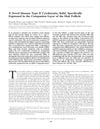Keratin Disorders: From Gene to Therapy
September 2011
in “
Human molecular genetics online/Human molecular genetics
”

TLDR New treatments targeting specific genes show promise for treating keratin disorders.
Keratins are structural proteins in epithelial tissues, including skin, cornea, hair, and nails, with 54 identified mammalian keratins. Mutations in these keratins can lead to disorders characterized by tissue fragility, particularly affecting the hair follicle, which is the most complex epithelial structure and contains about half of the keratin genes. Only four keratin genes have been linked to human genetic disorders such as monilethrix, hair–nail ectodermal dysplasia, pseudofolliculitis barbae, and woolly hair. Keratin disorders are dominant-negative genetic disorders and pose a significant healthcare challenge. Recent developments in RNA interference, specifically using small-interfering RNAs (siRNAs), have shown promise in treating these disorders by targeting and silencing mutant alleles. This approach has been successful in developing treatments for conditions like epidermolysis bullosa simplex, pachyonychia congenita, and Messmann epithelial corneal dystrophy, indicating a potential new era in genetic disorder therapy.
